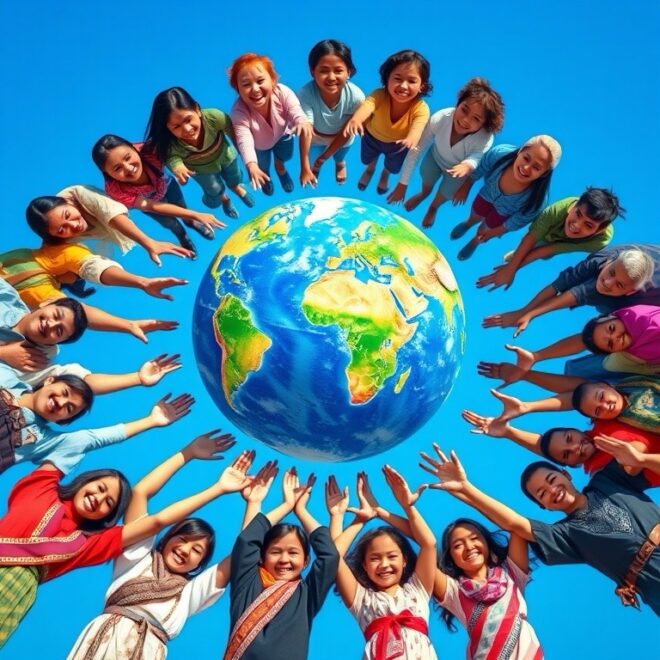
Introduction
In an era marked by rapid globalisation, technological advancements and persistent social divisions, the concept of human unity and the equal value of every life stands as a beacon of hope and moral imperative. The unity of humanity refers to the profound interconnectedness that binds all people together, transcending superficial differences such as race, ethnicity, religion, nationality, gender or socioeconomic status. It posits that beneath these variations lies a shared essence – a common humanity – that demands recognition and respect. Equally vital is the principle that every human life holds intrinsic and equal value, not contingent on achievements, origins or beliefs, but inherent in our existence as sentient beings capable of love, suffering and growth.
This idea is not novel; it has echoed through the corridors of history, philosophy, religion, and culture across the globe. From ancient sages to modern activists, thinkers have articulated this truth in ways that resonate with their contexts, yet converge on a universal message. The pursuit of unity amid diversity is not merely an idealistic dream but a practical necessity for survival and flourishing. As conflicts arise from perceived divisions – be they ideological, territorial, or cultural – the affirmation of equality serves as a counterforce, fostering peace, justice and collective progress.
Consider the philosophical underpinnings: unity does not imply uniformity but rather harmony in diversity? It celebrates differences as enrichments to the human tapestry, much like colours in a mosaic that gain beauty through contrast. The equal value of life challenges hierarchies that have plagued societies, from caste systems to racial supremacies, urging us to dismantle barriers and build bridges. In today’s world, where migration, climate change and pandemics remind us of our interdependence, embracing this unity is crucial. The COVID-19 pandemic, for instance, illustrated how a virus respects no borders, affecting all equally and requiring global cooperation for resolution. Wars and conflicts, such as those in ongoing global hotspots, further underscore the cost of division, where lives are devalued based on arbitrary lines drawn on maps or in minds.
This essay explores the unity of humanity and the equality of every human life through a multifaceted lens. It draws on famous quotes from diverse cultures and religions, weaving them into discussions of philosophical foundations, religious teachings, historical movements and contemporary applications. By examining these perspectives, we uncover a timeless consensus: humanity’s strength lies in its oneness, and true progress demands that we honour the equal worth of all lives. Ultimately, this recognition is not just intellectual but transformative, calling us to action in our daily interactions, policies and global endeavours. Through this exploration, we will delve into how these ideas have shaped societies, inspired revolutions and continue to guide ethical frameworks in the modern age.
To fully appreciate this unity, we must first understand its historical and philosophical roots, which reveal a consistent thread across civilisations. These foundations not only provide intellectual grounding but also offer practical wisdom for addressing today’s challenges. As we proceed, we will see how these ancient insights inform religious doctrines, which in turn influence modern thought and action.
Philosophical and Ancient Perspectives
The roots of human unity and equality trace back to ancient philosophies, where thinkers grappled with the nature of existence and society. In ancient Greece, Socrates declared, “I am not an Athenian, nor am I a Greek. I am a citizen of the world.” This assertion, from a philosopher who emphasised ethical living and self-examination, underscores a cosmopolitan view that transcends local identities, promoting a global fraternity where all humans share equal dignity. Socrates’ dialogues often highlighted the importance of virtue over birthright, implying that moral worth is universal and not confined to any group.
Similarly, in Chinese thought, Sun Tzu, known for “The Art of War,” offered a metaphor for unity in diversity: “There are not more than five musical notes, yet the combinations of these five give rise to more melodies than can ever be heard. There are not more than five primary colours, yet in combination they produce more hues than can ever be seen.” Though applied to strategy, this illustrates how diversity enhances wholeness, implying that human variations contribute to a richer collective experience, with each life equally vital to the harmony. Confucian teachings further this by stressing ren – benevolence – toward all, regardless of status, fostering societal harmony through mutual respect.
Indian philosophy provides profound insights through concepts like Vasudhaiva Kutumbakam, meaning “the world is one family.” This ancient Sanskrit phrase from the Maha Upanishad emphasises interconnectedness and equality, viewing all humans as kin. Virchand Gandhi echoed this: “This is my country, that is your country; these are the conceptions of narrow souls – to the liberal minded the whole world is a family.” Rooted in Jainism and Hinduism, it challenges nationalism, advocating for universal brotherhood where every life is equally precious. The Upanishads further explore atman – the self – as identical in all, dissolving distinctions and affirming intrinsic equality.
In African traditions, the philosophy of Ubuntu encapsulates unity: “I am because we are.” Archbishop Desmond Tutu elaborated: “My humanity is bound up in yours, for we can only be human together.” This communal ethic, prevalent in sub-Saharan cultures, asserts that individual worth is inseparable from the community’s, promoting equality by recognising interdependence. Ubuntu has influenced reconciliation efforts, such as in post-apartheid South Africa, where it guided truth and reconciliation commissions to heal divisions.
Stoicism, from Roman thinkers like Marcus Aurelius, reinforces this. He wrote, “We are all fellow citizens of the world,” urging empathy and justice toward all. These ancient views laid the groundwork for later ideas, showing that across continents, sages intuited humanity’s oneness. Aurelius’ meditations often reflected on the interconnectedness of all things, viewing humanity as a single organism where harm to one part affects the whole.
Expanding on these, philosophers like Immanuel Kant argued for the categorical imperative: treat others as ends in themselves, not means, implying inherent equality. John Locke influenced modern democracy with natural rights – life, liberty, property – for all. These ideas evolved, but their core remains: unity through equal valuation of lives. Locke’s theories underpinned declarations of independence and human rights charters, emphasising that governments exist to protect these equal rights.
In Mesoamerican cultures, Aztec and Maya cosmologies viewed humans as part of a cosmic web, equal in their roles sustaining the universe. Though less quoted, this holistic view aligns with global ancient wisdom, where rituals and myths reinforced communal bonds over individual hierarchies.
Thomas Paine, bridging ancient and modern, stated: “The world is my country, all mankind are my brethren, and to do good is my religion.” This Enlightenment perspective synthesises philosophical unity, emphasising moral equality. Paine’s writings fuelled revolutions, arguing that monarchy and aristocracy violated natural equality.
These foundations reveal a cross-cultural consensus: diversity is not division but the fabric of unity, and every life, equal in value, contributes uniquely. This philosophical heritage continues to inspire ethical systems, from utilitarianism – which seeks the greatest good for all – to existentialism, which affirms individual freedom within a shared human condition.
Religious Views on Unity and Equality
Religions worldwide affirm human unity and life’s equal value, often as divine mandates. In Christianity, the Bible states: “There is neither Jew nor Greek, there is neither slave nor free, there is no male and female, for you are all one in Christ Jesus” (Galatians 3:28). This Pauline verse erases social hierarchies, proclaiming spiritual equality. Psalms 133:1 adds: “Behold how good and how pleasant it is for brethren to dwell together in unity.” Jesus’ teachings, like the Good Samaritan parable, emphasise loving neighbours regardless of differences, valuing all lives equally. The Sermon on the Mount further calls for mercy and peacemaking, principles that have inspired social justice movements.
Islam echoes this in the Quran: “O mankind, indeed We have created you from male and female and made you peoples and tribes that you may know one another.” (49:13). This verse celebrates diversity for mutual understanding, not superiority, asserting equality before Allah. Prophet Muhammad said, “All mankind is from Adam and Eve, an Arab has no superiority over a non-Arab nor a non-Arab has any superiority over an Arab.” This farewell sermon reinforces racial and ethnic equality, influencing Islamic jurisprudence on human rights.
Hinduism’s Advaita Vedanta posits non-duality: all is Brahman, making separations illusory. The Bhagavad Gita (5:18) states: “The humble sages, by virtue of true knowledge, see with equal vision a learned and gentle brahmana, a cow, an elephant, a dog and a dog-eater.” This equality extends to all beings, human lives included. Karma and dharma concepts encourage actions that uphold societal harmony, treating all with respect.
Buddhism teaches interdependence through Pratityasamutpada. The Dhammapada says: “All beings tremble before violence. All fear death. All love life. See yourself in others. Then whom can you hurt?” This empathy-based equality discourages harm, promoting unity. The Bodhisattva ideal commits to alleviating suffering for all, embodying compassionate equality.
Judaism’s Torah commands: “You shall love your neighbour as yourself” (Leviticus 19:18), implying equal worth. The concept of Tikkun Olam – repairing the world – calls for justice for all. Prophetic books decry oppression, advocating for the widow, orphan, and stranger.
In Sikhism, Guru Nanak declared: “There is no Hindu, there is no Muslim,” rejecting divisions, affirming oneness. The Guru Granth Sahib teaches equality through langar – communal meals where all sit together.
Baha’i faith explicitly states: “The world of humanity has two wings – one is women and the other men. Not until both wings are equally developed can the bird fly.” This metaphor for gender equality extends to all, with ‘Abdu’l-Bahá saying: “There is unity in diversity. Each sets off and enhances the other’s beauty.”
Indigenous spiritualities, like Native American, view all life as sacred kin. Black Elk said: “The first peace, which is the most important, is that which comes within the souls of people when they realise their relationship, their oneness with the universe.”
Sufism, within Islam, through Rumi: “Christian, Jew, Muslim, shaman, Zoroastrian, stone, ground, mountain, river, each has a secret way of being with the mystery, unique and not to be judged.” This poetic unity embraces diversity.
These religious quotes converge: divinity ordains equality and unity, urging compassionate living. Yet, interpretations vary; some sects have justified inequalities. True essence, however, aligns with equality, as seen in interfaith dialogues promoting harmony. Ecumenical movements, like the World Council of Churches, exemplify this by fostering cooperation across denominations.
Religious leaders have often been at the forefront of social change, using these teachings to challenge injustice. For example, the Dalai Lama’s advocacy for global ethics draws on Buddhist principles to promote universal responsibility.
Modern Thinkers and Leaders
Modern figures have championed unity and equality, drawing from ancient wisdom amid contemporary challenges.
Mahatma Gandhi said: “Our ability to reach unity in diversity will be the beauty and the test of our civilisation.” Leading India’s independence through nonviolence, he embodied this, uniting diverse groups against colonialism while advocating for all lives’ sanctity. Gandhi’s philosophy of satyagraha – truth force – emphasised moral equality, influencing global nonviolent movements.
Martin Luther King Jr.: “We are caught in an inescapable network of mutuality, tied in a single garment of destiny. Whatever affects one directly, affects all indirectly.” In the civil rights movement, he fought racial inequality, dreaming of a world where character, not colour, defines worth. His “I Have a Dream” speech galvanised millions, drawing on Christian and Gandhian ideals.
Nelson Mandela: “No one is born hating another person because of the colour of his skin, or his background, or his religion. People must learn to hate, and if they can learn to hate, they can be taught to love.” After decades in prison, he led South Africa’s transition to democracy, prioritising reconciliation over retribution.
Kofi Annan: “We may have different religions, different languages, different coloured skin, but we all belong to one human race.” As UN Secretary-General, he promoted global unity, emphasising equality in human rights. His work on the Millennium Development Goals aimed to uplift the marginalised worldwide.
Maya Angelou: “It is time for parents to teach young people early on that in diversity there is beauty and there is strength.” Her poetry celebrated black experiences while advocating universal humanity, highlighting resilience and shared struggles.
Mikhail Gorbachev: “Peace is not unity in similarity but unity in diversity, in the comparison and conciliation of differences.” Ending the Cold War, he highlighted reconciliation, paving the way for reduced global tensions.
Malala Yousafzai: “We realise the importance of our voices only when we are silenced,” fighting for education equality. As the youngest Nobel laureate, she symbolises youth’s role in advocating for equal opportunities.
John Hume: “Difference is of the essence of humanity. Difference is an accident of birth and it should therefore never be the source of hatred or conflict. The answer to difference is to respect it.”
Evo Morales: “We are going forward with the idea of a multicultural, a multinational state, trying to live in unity, at the same time respecting our diversity.” As Bolivia’s indigenous president, he advanced pluricultural policies.
These leaders show unity’s practicality in addressing injustices, from apartheid to gender inequality. Their legacies inspire ongoing activism, such as Black Lives Matter, which asserts the equal value of black lives amid systemic racism.
In literature, Isaac Asimov: “There are no nations! There is only humanity. And if we don’t come to understand that right soon, there will be no nations, because there will be no humanity.”
John Lennon: “Imagine there’s no countries… Nothing to kill or die for, and no religion too. Imagine all the people living life in peace.”
These visions inspire movements like human rights campaigns, where equality is non-negotiable. Amnesty International and similar organisations embody this by defending dignity worldwide.
Feminist thinkers like Simone de Beauvoir argued for gender equality as part of human unity, stating, “One is not born, but rather becomes, a woman,” challenging constructed inequalities.
Environmentalists like Wangari Maathai linked human unity to planetary stewardship: “In the course of history, there comes a time when humanity is called to shift to a new level of consciousness, to reach a higher moral ground.”
These modern voices adapt ancient wisdom to contemporary issues, proving the enduring relevance of unity and equality.
Challenges and Implications Today
Despite these affirmations, challenges persist. Inequality manifests in poverty, discrimination, wars. Systemic racism, gender disparities, xenophobia fracture unity. Economic gaps, where the wealthiest 1% control disproportionate resources, devalue billions of lives.
Climate change disproportionately affects vulnerable populations, testing equality commitments. Migration crises highlight how we value “other” lives, with refugees often facing hostility despite shared humanity.
Technology, while connecting, can amplify divisions via echo chambers and misinformation. Social media algorithms reinforce biases, hindering unity.
Yet, opportunities abound. Global initiatives like the UN Sustainable Development Goals aim for inclusive societies, targeting no poverty, zero hunger, and reduced inequalities. Social media also fosters cross-cultural dialogues, enabling movements like #MeToo to unite women globally.
Education is key: teaching empathy and history combats prejudice. Curricula incorporating diverse perspectives build understanding from youth.
In business, diversity inclusion boosts innovation, proving unity’s benefits. Companies like Google emphasise inclusive hiring, recognising varied viewpoints drive success.
Healthcare equity, as in universal access, affirms life’s equal value. Pandemics revealed disparities, prompting calls for global vaccine equity.
Politically, leaders must prioritise human rights over nationalism. International bodies like the International Criminal Court hold violators accountable, reinforcing equality under law.
Individuals can practice unity through kindness, challenging biases in daily life. Volunteerism, community service, and intercultural exchanges build bridges.
As William Sloane Coffin noted: “Each of us, helplessly and forever, contains the other – male in female, female in male, white in black and black in white. We are part of each other.”
C. JoyBell C.: “We are all equal in the fact that we are all different… We don’t share blood, but we share the air that keeps us alive.”
Addressing challenges requires collective will, transforming rhetoric into reality. Grassroots efforts, like community gardens in divided neighbourhoods, demonstrate small acts fostering unity.
Looking forward, emerging technologies like AI must be developed ethically to avoid exacerbating inequalities. Global challenges like space exploration could unite humanity in shared endeavours.
Conclusion
The unity of humanity and equal value of every human life form the bedrock of a just world. From ancient philosophies to modern advocacy, quotes across cultures affirm this truth. Embracing it fosters peace; ignoring it invites peril. Let us commit to living this unity, honouring all lives as sacred and equal.
In conclusion, this essay has traversed the philosophical, religious, and modern landscapes of human unity and equality. The consistent message across time and space is clear: we are one family, each member invaluable. By internalising this, we can build a world where differences enrich rather than divide, and every life thrives in mutual respect. The journey toward this ideal is ongoing, but with collective effort, it is achievable. As we face future uncertainties, let this principle guide us toward a harmonious global society.


